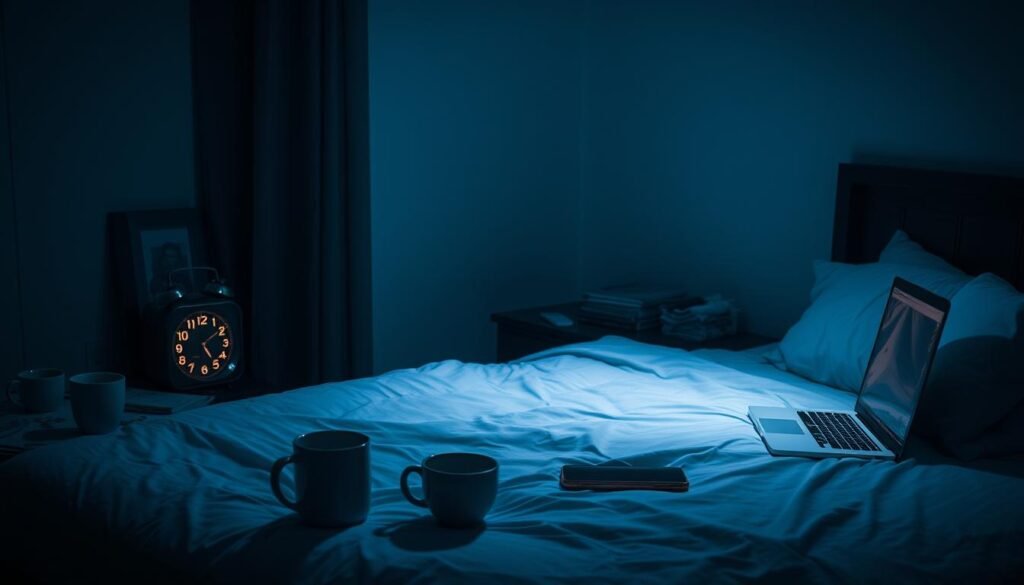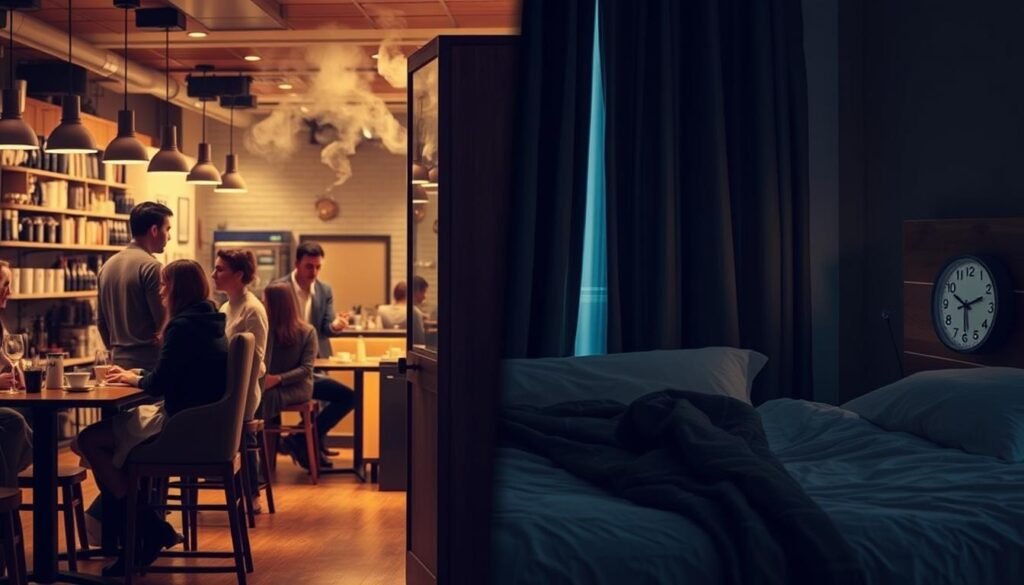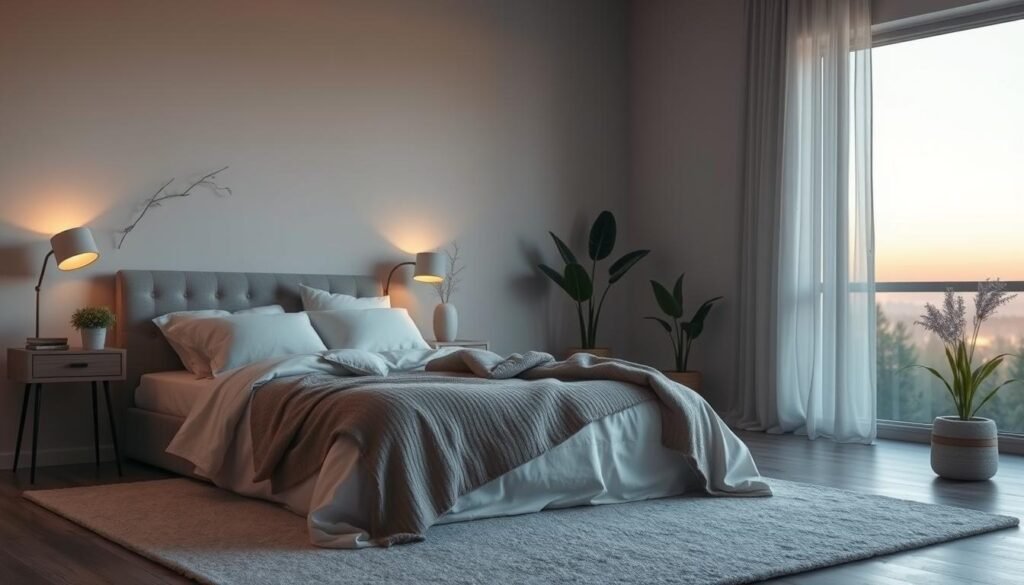About 30% of adults sometimes face insomnia, and 10% have it chronically. Sleep matters a lot for health, affecting everything from mood to heart disease. Knowing what not to do is key for better sleep.
Good sleep hygiene boosts how well you sleep. It involves habits and your environment. For tips on good sleep routines, check out Mayo Clinic.
Key Takeaways
- Avoid heavy meals and caffeine close to bedtime to promote better sleep.
- Maintain a consistent sleep schedule to help regulate your internal clock.
- Limit screen time before bed to minimize the impact of blue light on sleep quality.
- Keep your bedroom cool, dark, and quiet for an optimal sleep environment.
- Engage in relaxing activities before sleeping to reduce stress and ease into rest.
The Importance of Sleep Hygiene
Sleep hygiene is key to better sleep and overall health. It means knowing daily habits that boost sleep quality. Small changes can make your nights more restful.
These changes help prevent insomnia and improve sleep patterns.
Understanding Sleep Hygiene
Sleep hygiene includes habits for better sleep. It’s about a regular sleep time and a calm routine before bed. It also involves healthy life choices.
Many in the U.S. struggle with getting enough sleep. Poor sleep habits can cause:
- Difficulties falling asleep
- Frequent sleep disturbances
- Daytime sleepiness
Good routines can fix these issues and enhance sleep quality.
Benefits of Good Sleep Hygiene for Insomnia
Good sleep habits have many benefits. They can improve your mood and make you more productive. They also enhance your overall life quality.
These habits are easy to adopt and safe. They help prevent insomnia and promote healthy behaviors.
| Sleep Hygiene Practice | Positive Effects |
|---|---|
| Consistent Sleep Schedule | Regulates body clock, reducing insomnia symptoms |
| Relaxing Bedtime Routine | Enhances readiness for sleep |
| Avoiding Stimulants | Improves falling asleep and sleep continuity |
| Healthy Sleep Environment | Minimizes disturbances, promoting deeper sleep |
| Regular Exercise | Supports better sleep patterns over time |
| Diet Management | Contributes to sound sleep when timed appropriately |
Don’ts for Preventing Insomnia
To stop insomnia, it’s vital to know what not to do. Not managing your consumption of things like caffeine can hurt your sleep. When you don’t follow good sleep habits, it can lead to ongoing sleep problems. This makes it hard to stay healthy and feel good.
Avoiding Stimulants Before Bed
Stimulants like coffee and cigarettes can make sleeping difficult. Even having coffee early can keep you awake at night. To avoid insomnia, try not to have caffeine after lunch. Smoking also harms your health and messes up how well you sleep. So, it’s best to not use nicotine products before going to bed.
Consequences of Ignoring Sleep Hygiene
Not caring for your sleep hygiene can cause bad sleep issues, like ongoing insomnia. When you spend too long in bed trying to sleep, it only makes sleep harder to come by. Watching the clock can make you upset, and that makes sleep even more difficult. Also, sleeping too much during the day or working out too late can mess up your sleep at night. Good sleep habits improve your mind and body health.

| Don’ts for Preventing Insomnia | Impact |
|---|---|
| Consuming caffeine after noon | Difficulty falling asleep, shallow sleep |
| Smoking before bed | Disruption of sleep patterns |
| Ignoring a regular sleep schedule | Inconsistent sleep patterns, increased insomnia |
| Clock-watching when unable to sleep | Increased anxiety and frustration |
| Taking long naps in the afternoon | Interference with nighttime sleep |
The Impact of Caffeine Consumption on Sleep
Caffeine affects our sleep and overall health. It’s found in coffee, tea, and energy drinks. Its impact goes beyond just keeping us awake. When we drink it later in the day, it can mess with our sleep cycle.
How Caffeine Affects Your Sleep Cycle
Caffeine stops adenosine receptors in our brain from working. These receptors help us feel sleepy. Blocking these can make it hard to fall asleep and lower the quality of our sleep.
Drinking caffeine too close to bedtime shortens our sleep. It also messes with deep sleep stages. This stops our body from resting fully. The American Medical Association says we should watch our caffeine intake for better sleep.
Recommended Timing for Caffeine Consumption
Experts say to avoid caffeine after 3 p.m. This helps make sure it doesn’t disrupt our sleep. Our bodies need time to process caffeine before we go to bed.
Watching how much caffeine we consume can help, especially if we have trouble sleeping. To sleep better, it’s important to consider how much caffeine we’re having.

The Role of Screen Time Before Bed
Screen time affects our sleep, especially right before bed. Devices emit blue light, confusing the brain. This lowers melatonin, a crucial sleep hormone. With less melatonin, falling asleep gets harder.
Effects of Blue Light on Sleep Quality
Research shows blue light at night can delay sleep and lower its quality. Over 60% of middle schoolers and nearly 70% of high schoolers get less sleep than they should. Phones and gadgets are big distractions. They block melatonin, making sleep patterns worse. This often leads to feeling tired the next day. People spend over three hours a day on their phones. This makes reaching deep sleep take longer.
Best Practices for Reducing Screen Time
To better our sleep, cutting down on screen time is key. Experts advise turning off devices 30 minutes before sleeping. This helps the brain get ready for a good night’s rest. Limiting daily screen use with apps can also be effective. If you must use screens, try blue light filters or night modes. Learning about good sleep habits also helps in getting enough quality sleep.
Creating a Restful Bedroom Environment
A good night’s sleep starts with the right bedroom setup. Making sure your bed is comfy, the room is quiet, and the lighting is soft can help a lot. Also, keeping it cool and dark at night can improve your sleep quality.
Elements of a Sleep-Friendly Environment
Several things can make your bedroom better for sleep. Here are important parts of a good sleep space:
- Comfortable Mattress: A good mattress is key for quality sleep.
- Noisy Distractions: Less noise means deeper sleep.
- Light Control: Blackout curtains help block out unwanted light.
- Cool Air: A cool room helps you sleep better.
Temperature and Darkness: Key Factors
Keeping your room cool and dark is very important for sleep. Studies show that temperatures between 60 and 67°F (15.6 and 19.4°C) are best. Aim for around 65°F (18.3°C) for the easiest time falling and staying asleep.
Dark rooms also aid in sleep. Light can stop your body from making melatonin, making sleep hard to come by. A dark room tells your body it’s time to sleep, thus improving your sleep quality. By focusing on both coolness and darkness, you create a perfect space for sleep.

| Sleep-Friendly Factors | Recommended Levels |
|---|---|
| Temperature | 60-67°F (15.6-19.4°C) |
| Light Exposure | Minimal (Blackout curtains recommended) |
| Noisy Environment | Minimal (Use sound machines if necessary) |
| Mattress Quality | Comfortable and supportive |
Managing Stress for Better Sleep
High stress levels can mess with your sleep a lot. People with insomnia often find their sleep troubles grow worse because of stress or worry. Figuring out this insomnia connection can really help improve how well you sleep. There are many good stress management methods that lead to relaxation and better sleep.
Techniques for Relaxation and Anxiety Reduction
Using different relaxation techniques can lower stress and make it easier to sleep. Consider trying the following:
- Mindfulness meditation
- Deep breathing exercises
- Journaling thoughts and feelings
- Gentle yoga or stretching routines
- Visual imagery exercises
These methods help clear your mind from worries, making it easier to fall asleep. Experts say making these techniques part of your bedtime routine can help you feel calm before sleep.
The Connection Between Stress and Insomnia
Getting good sleep and managing stress well are linked closely. Stress can mess with your sleep and start a tough insomnia cycle. Anxiety can lead to sleep problems for many. By tackling these issues and following the right strategies, like behavior treatments, you can reduce how often you can’t sleep.
Looking after your mental health is key. Getting help for anxiety or doing things that make you feel good emotionally can majorly boost your sleep quality. Having a routine that includes time to relax and keeps your sleep on track is also really good for your health.
Making a strong link between relaxing and sleeping can help you sleep well at night. For more tips and ideas on how to stop the cycle of worry and sleepless nights, check out resources like this detailed guide.
Exercise Timing and Its Impact on Sleep
Knowing how exercise timing affects sleep is key for improving rest. Exercise has many benefits, such as better mental health and sleep. But, the time you exercise can make a big difference. It’s especially true for avoiding workouts right before bed.
Benefits of Regular Exercise
Regular exercise boosts sleep health. Studies show that 30 minutes of daily aerobic exercise means better sleep. If done weekly, this adds up to 150 minutes and greatly improves sleep patterns. Interestingly, working out in the evening doesn’t always disrupt sleep, if done early enough. This helps reduce insomnia for many people.
Avoiding Late-Night Workouts
However, working out too late can do more harm than good. High-intensity exercises like running or heavy lifting rev up the nervous system. This makes relaxing hard. Lighter activities, such as yoga or biking, are better before bedtime. Make sure to finish these at least one hour before going to sleep. This way, your sleep won’t suffer because of your exercise time.
Napping Habits: The Right Approach
Napping habits play a key role in our well-being. A quick nap can refresh us. But, it’s important to know the proper way to nap. Knowing the impact of long or irregular naps can prevent nighttime sleep issues.
Effects of Long and Irregular Naps
Long or random napping can harm sleep quality. Studies show that naps over 30 minutes might make you feel groggy. This can disrupt your productivity and thinking skills. Ideally, naps should last 10 to 20 minutes for a refreshing effect. On the other hand, very long naps may increase the risk of health problems.
- Napping for more than 90 minutes might disrupt your nighttime sleep.
- Long naps could be linked to a higher risk of type 2 diabetes.
- People taking naps at irregular times often face sleep problems.
When is Napping Beneficial?
Napping wisely can boost your energy and sharpness, especially if you’re tired. Short naps, one or two times a week, can lower heart health risks. They are also helpful after a short night’s sleep. A short nap can support your immune system and mood.
In terms of work, the National Heart, Lung, and Blood Institute found that a quick nap can improve job performance. Athletes might see better endurance and focus from napping. For more tips on good napping habits, check out this resource.
| Nap Duration | Benefits | Potential Risks |
|---|---|---|
| 10-20 minutes | Boosts alertness and performance | No significant risks |
| 30-60 minutes | Improves memory consolidation | May cause grogginess |
| 90 minutes | Completes a full sleep cycle | Possible interference with nighttime sleep |
It’s key to be mindful of nap timing and duration. This awareness can enhance sleep quality and overall health.
Conclusion
Making changes to improve sleep hygiene can change how well you fight insomnia. Over 80% of people sometimes struggle to fall asleep. So, it’s key to form habits for better sleep.
Things like how much we use screens and what’s around us when we try to sleep matter a lot. By changing these, you can sleep better and feel better overall.
Techniques to manage stress, like the 4-7-8 breathing method, can help you relax at bedtime. Also, sticking to a regular sleep time and having a bedroom that’s quiet and dark helps. These steps help stop insomnia and let you rest well at night.
Better sleep hygiene is essential, but it’s just one part of handling insomnia. Knowing about these practices can lead you to the rest you need. Making a bedtime routine that focuses on being calm and caring for where you sleep can help you escape the hold of insomnia.